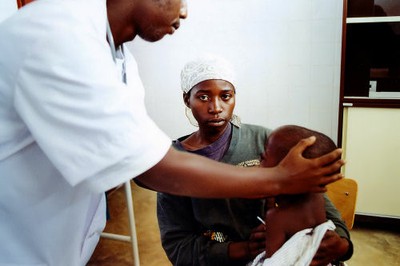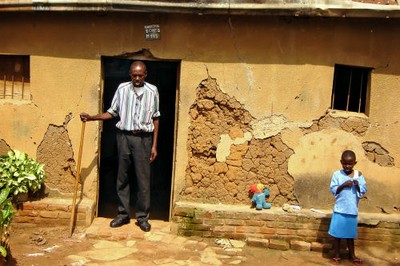Rwanda – SOS Medical and Social Centres
In Rwanda there are currently three Social Centres and two Medical Centres for children and the local community, examples of which are Kigali and Byumba. Many SOS Social Centres operate via Family Strengthening Programmes, which aim to support the wider community. Below is some information about some of the Social Centres that SOS Children runs in Rwanda:
SOS Medical Centres around Rwanda: In-Depth
 Byumba
Byumba
Description of SOS Medical Centre:
In just a short space of time, the SOS Children's Village Byumba had become an essential part of its neighbourhood in every respect. It became even more important when an SOS Medical Centre was also opened in February 1999, which has ensured health care for them since then. Around 4,500 people use the small clinic yearly, which in addition to a treatment and a check-up room, contains a laboratory and a dispensary.
Work and Achievements:
Byumba SOS Medical Centre has 7 employees including 3 nurses, 1 laboratory assistant, 1 secretary and 2 general services staff. This medical centre treated 3,773 cases during the year 2009, among them, 425 were SOS boys cases while 477 were internal girls’ cases. Hence, some patients were treated many times. The cases of children coming outside of children’s village were 413 boys and 566 girls while adults’ cases treated number 1,892, male and female taken together. Sick people external to SOS come essentially from Gihembe refugee camp, located near the village and others from various parts of Byumba. The medical doctor is present every Friday and during other days, medical check ups are carried out by a nurse.
Since Byumba is located in the high mountains where the climate is quite cold, the respiratory tract diseases and rheumatisms are quite common. Amoebiasis, worms, typhoid fever, and skin diseases are the most frequent due to poor hygiene. In order to address this issue, the centre has decided to reinforce health education. A bungalow will be built for daily presentations before the consultations begin. This is an efficient preventive measure.
Kigali
Description of SOS Medical Centre:
After the civil war had brought endless sorrow to the whole of Rwanda and since even prior to it health care had been inadequate, SOS Children's Villages decided to create an SOS Medical Centre that has been available for the people to use since March 1998 (about 3,800 patients per year). The clinic consists of two treatment rooms, two laboratories and a health education room so as to give people as great an understanding as possible as to how their body functions.
Work and Achievements:
Kigali SOS medical centre has 15 employees including 2 administrative staff, 1 medical doctor, 4 nurses, 1 laboratory technician, 1 assistant to the laboratory technician and 6 support staff. The former medical doctor has retired and a new one started working on November 2nd, 2009. In addition to this regular team, a gynaecologist does the medical consultations of pregnant women each Saturday.
The number of cases treated this year has decreased compared to the situation of previous year. Last year, 4,316 cases were treated while in 2009; only 2,247 were treated, which means an average of 8 cases per day.
SOS Social Centres in Rwanda: In-Depth:
 Kigali
Kigali
Description of SOS Social Centre/FSP:
The family strengthening program at Kigali cared for 250 children, direct beneficiaries and 206 indirect beneficiaries during 2009. Among these beneficiaries, 121 attend primary school while 80 attend secondary school. The performance rate among primary school pupils was 52.7% and 77.1% among secondary school student. This performance has improved thanks to the meetings where children were motivated and sensitized to work hard to improve their school results.
Byumba
Description of SOS Social Centre/FSP:
The family strengthening programme has assisted 250 children, direct beneficiaries and 473 indirect beneficiaries, of whom siblings and parents or caregivers split up into 124 households. The programme has supported these beneficiaries through various services such as education, nutrition, health care, psychological and social support. At the same time, families are empowered to take care of their children through income generating activities.
Gikongoro
Description of SOS Social Centre/FSP:
The family strengthening programme cared for 250 children split up into 159 families. The programme has assisted 69 children attending secondary school, 143 pupils, including 13 who study in our primary school and 14 children in the nursery school, including 13 who are in our Kindergarten. Coaching has been provided to those attending SOS primary school in order to facilitate their quick integration. Those who have exceeded the school age or had dropped out school that are already old have been encouraged to go for vocational training. Therefore, 3 children joined 3 others in mechanics. A girl has completed her training in hairdressing and another is studying tailoring.

 Return to Schools Wikipedia Home page…
Return to Schools Wikipedia Home page…
